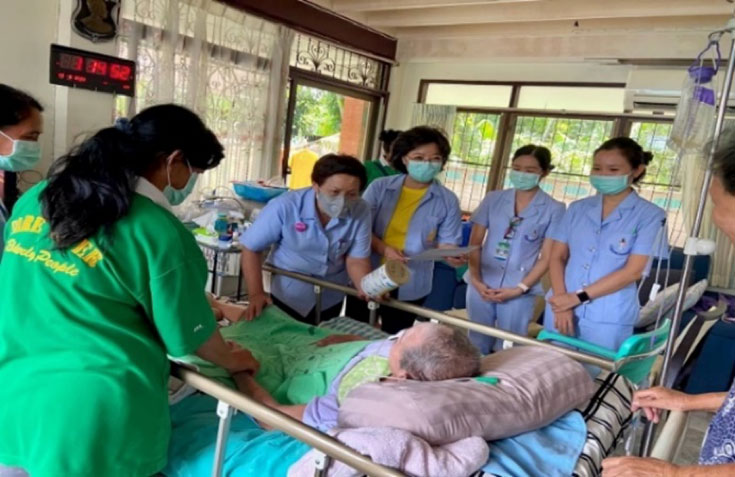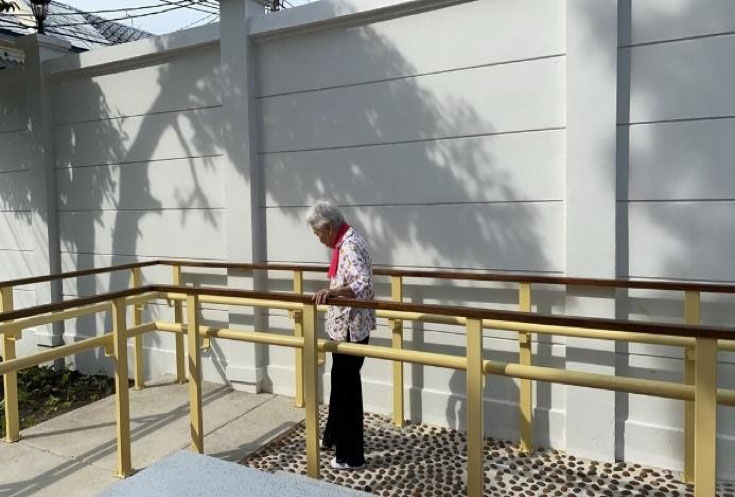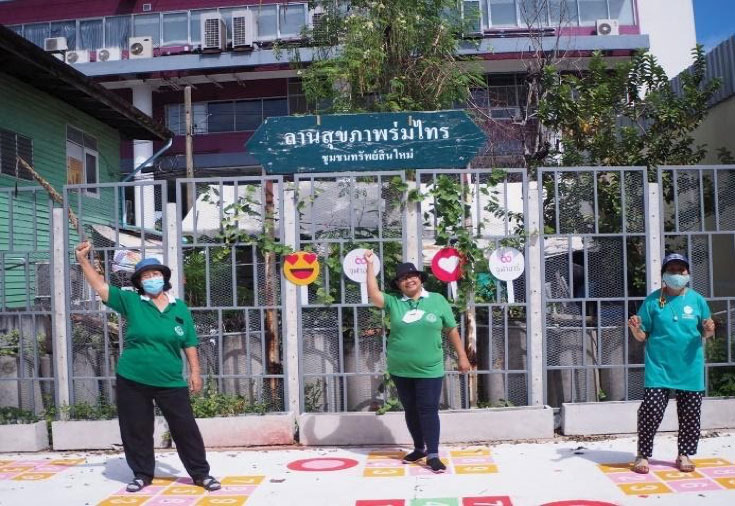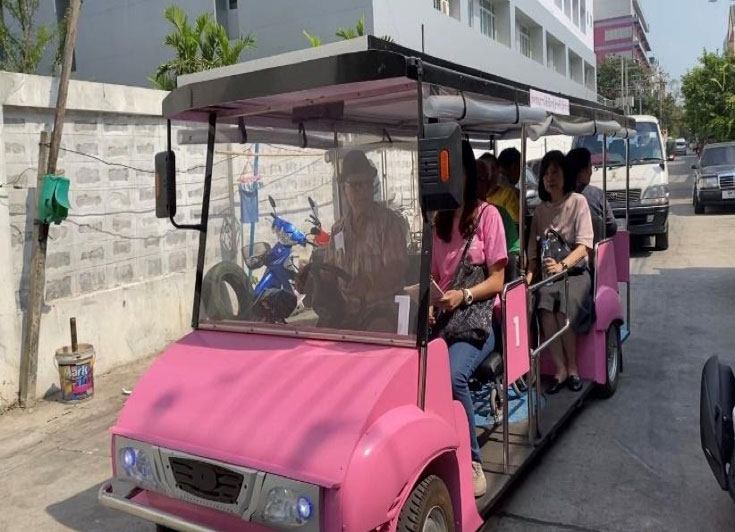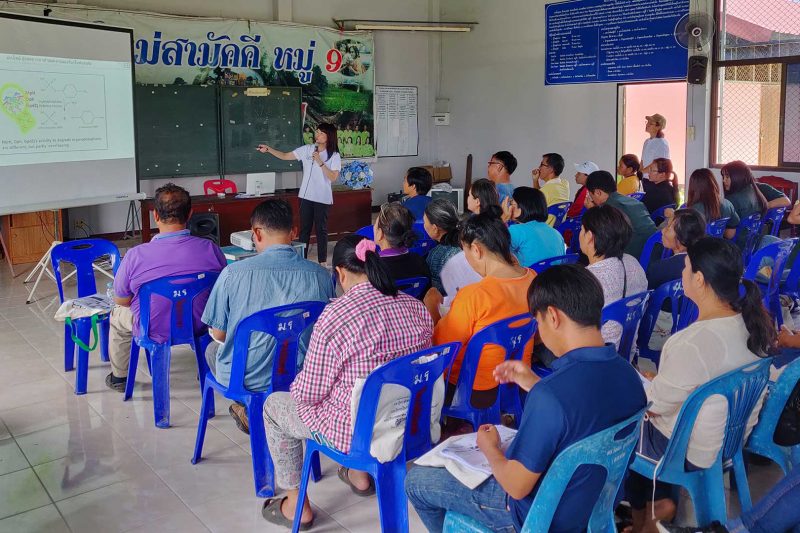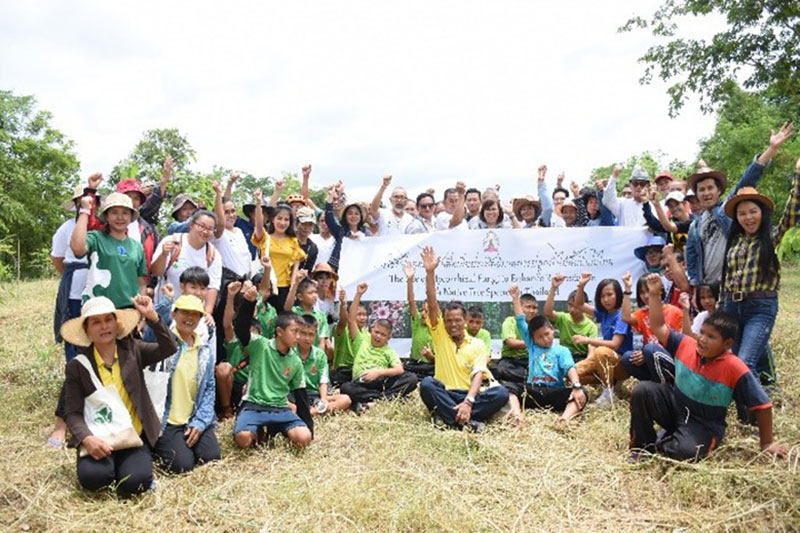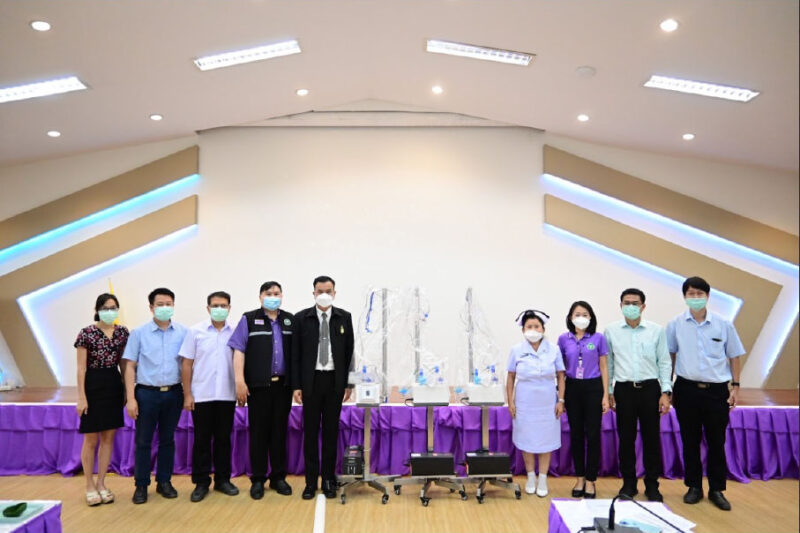Chula Ari is a model-society-driving innovation that supports the Thai elderly community.
The Office of the National Economic and Social Development Council pinpointed that 2021 will illustrate a complete transition into Aged society. With over 60 million citizens and growing, with up to 20% aged over 60, this is a result of economic prosperity and scientific development. Technology and decimalization enable Thais to live longer lives, while family planning results in 10 years of reduced childbirth, resulting in a lower fertility rate while decreasing mortality. The rapidly ageing population that has also impacted the economic infrastructure, especially in terms of production, is foreseen to be decreasing significantly. This also creates a societal impact that the government must solve, whether it is the idea of being isolated or psychological and medical expenses. The government will have to bear such expenses and will continue to do so in the future.
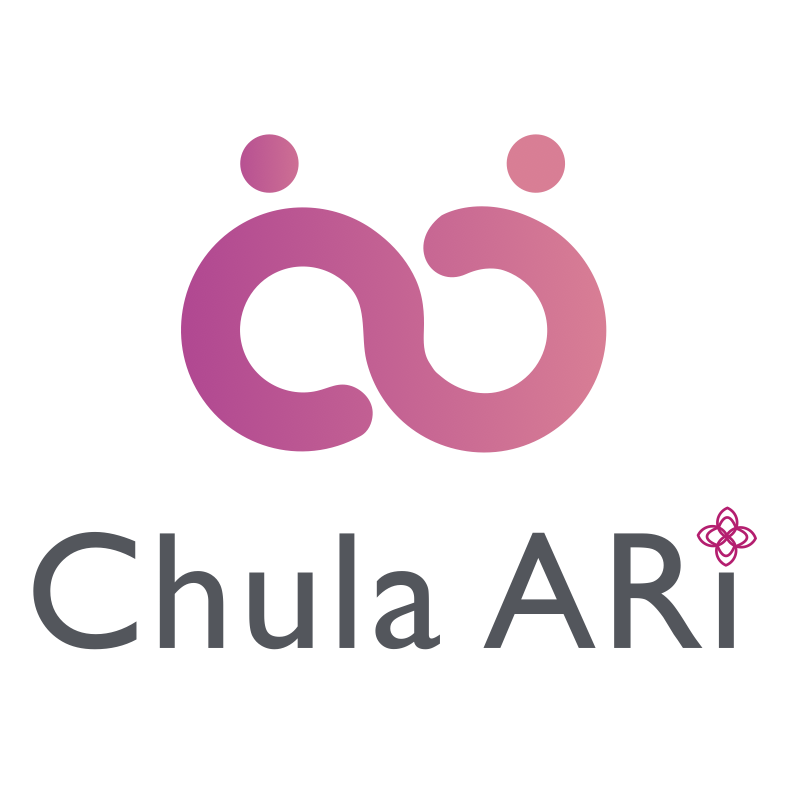
[ http://www.chulaari.chula.ac.th/ ]
Chulalongkorn University, one of the leading educational institutions in Thailand, which has various expertise, searches for ways to cooperate in order to alleviate the problems caused by changes in infrastructure in society by establishing a platform to support the elderly by using existing knowledge to help society as a whole under the title “Chula Ari: Chulalongkorn University Platform For Ageing Research Innovation”. This comes in many forms, including health, economics, and collaboration, all of which improve the quality of life for Thai seniors. This is done by research from elderly people living in the middle of Bangkok, which includes: This started with the Wang Thonglang Community, Sam Phraeng Community (Phraeng Phuthorn Phraeng Nara and Phraeng Suppasart), Phasi Charoen Community and Din Daeng Flat Community started in 2018.
Solve the problems of aging society with “5 Integrated interdisciplinary”
“Chula Ari” has developed knowledge and innovation for Thai society with 12 faculties under Chulalongkorn university. This can be categorized into 5 parts:
- Economic and cooperation
- Citizen and society
- Health
- Physical environment
- Technology and Culture
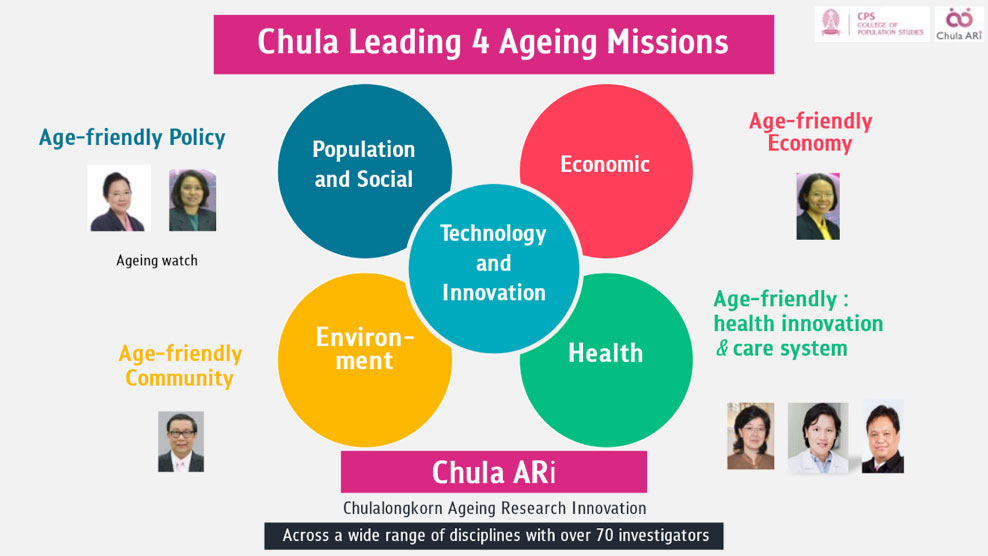
Caring for elders via Robots
Chula Ari has given robots for taking care of the elderly, “Ninja Chula Ari” to the Department of Older Persons, Ministry of Society Development and Human Security, which was developed from a Chula start up. This will be used for patients who are unable to move around at the “Center of Social Welfare Development for The Elderly, Pathumthani” for telemedication or long distance medical uses to help the elderly who live alone in the household communicate with doctors in order to reduce deaths or risks from diseases that are common in old age. As a result, Chula has received an award for CSR from the Elders Union for 2020.
To extend the “Ninja Chula Ari” robot, Chula Ari collaborates with Chulalongkorn University’s engineering and medicine faculties to develop a rehabilitation robot for stroke patients that uses telemedicine to enhance physical therapy and assist physiotherapists in revitalizing patients’ limbs. These innovations are used to promote and restore public health.
Two shoulder and elbow robots, two wrist robots, and one hip, knee, and ankle robot.
The robots won second place in the category of medical robotics and software from the i-MEDBOT Innovation Contest 2021, organized by the Center of Excellence for Biology (a public sector) or TCELS, the Ministry of Higher Education, Science, Research, and Innovation.
The Awards Asia 2022 honored the Rehabilitation robot (arm power) Strokes Patients.
The robots, including Ninja Chula Ari and also rehabilitation robots for stroke patients, were given to at least 12 hospitals in rural areas.
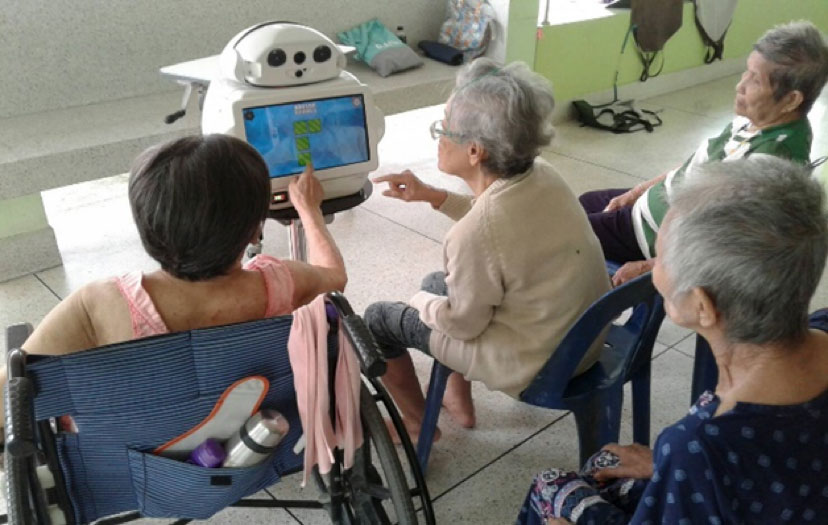
Cooperation from all Stakeholders to call for sustainable development
Other than coming together of different departments, Chula Ari has also received cooperation from non profit organizations such as Young Happy which hosts Healthy and well being events to encourage health care and teaches necessary skills to prepare for old age.
Chula Ari has also received local legislation cooperation in coordination with Bangkok government, which hosted a conference that brings fourth Chula Ari with its aims and development plans to cover different parts of Bangkok.
Chula Ari has made Thailand proud from recognition in the international levels hosted by College of Population Studies, Chulalongkorn University under the conference name “Measuring Population Ageing: Bridging Research and Policy” in cooperation with international organizations such as The Population Division of the Department of Economic and Social Affairs (UNDESA) of the UN, The International Institute for Applied Systems Analysis (IIASA) Austria, and The Economic and Social Commission for Asia and the Pacific (ESCAP)
The aim was to bring together experts to discuss matters regarding measurements of elders in the population, framework of thinking process to aid in country-wide legislation which adheres to international development goals.
Currently, Chula Ari is in its 3rd year which focuses on research on a national level along with communal level. This is to receive a database to further process. The data is gathered from 4 ideal communities with the total population of 1,361 people. This has shown that success from Chula Ari and cooperation from the private, public, and education sector plays a vital factor to help Thailand handle this important transition step towards a complete aged population. This creates awareness in the population and creates a view of importance of the cause. In turn, it provides a base knowledge for working age groups as well as elders to work towards “Elders live efficiently and happy”, counting as an innovation for society to support the aging population.
The development has pinpoint for 2021 to be an important year of infrastructural change in Thai citizen moving towards “complete aged society”
Moreover, throughout 2021, Chula Ari has also continuously developed innovation:
- Social innovation: creating research and plans for elder. During phase 3, there has been involvement from the society from the local scale to national scale. The plan dealt with innovative plans to protect and aid elders and families under various crises, including COVID-19. This has been created in collaboration with Department of Oder Persons Ministry Of Social Development And Human Security, which has received permission and consensus amongst National Elderly Person committee two times, second being on 30th June 2021 and will be used as the long term main plan to support the aging population and develop the life quality of Thai Elders
- Innovation in database of elders in the community: Creating database of elders in community that covers health, economy, society, environment, technology, and innovation aspects. The project of data storage with mobile application and sorting database and displaying such information on websites in the “dashboard” feature will allow users to navigate through the information efficiently. Moreover, the information of each individuals will be interconnected with GPS in case of any aid needed
- Innovation of machineries in the structure of robots for rehabilitation: This aims to help people both in elders that have problems in blood circulation problems in the brain and rehabilitation in muscles and strength of elders has been piloted in communities and health centers of Bangkok. As a development of Telemedicine Robots that has been used for patients dealing with blood circulation problems in the brain at Social Welfare Development Center Eldery (Patumthani) Ministry Of Social Development And Human Security, Chulalongkorn hospital, and Rajvithi Hospital
Moreover, the innovation resulted from this project has been given 1 runner up reward under robotics and software for medical and health purposes from medical robotics contest i-MEDBOT Innovation Contest hosted by Thailand Centre of Excellence for Life Sciences (Public Organisation) or TCELS Ministry of Higher Education, Science, Research and Innovation on the 3rd of September 2021 - Innovation to support elders in the communities:
Development of home visits as “Advanced Home Health Care Plus (AHHC+)” for elders who are unable to leave their homes in Bangkok. Create informational videos to teenagers and adults in support of saving behavior to create an understanding of importance in saving money and plan for spendings and monetary stability during old age.
Developing a plan for future cities that is an Age-Friendly City in accordance with the World Health Organization. The plan is to change home structures and living conditions to be elders friendly, this aims to provide elders with safety measures in living both indoors and outdoors. The plan also looks into transportation that would allow elders to travel efficiently and safety, benefit from joining activities, and create food stability of communities under crisis
The establishment of transportation via Muvmi and electric cars to provide efficient means of transportation of elders in the community
Chula ARi creates research that impact national policies
Chula ARi creates research that impact national policies in the form of the Action Plan on the Older Persons, Phase 3, which is a master plan for the ageing society from 2023 to 2037. This is in accordance with the national strategy and is also an important mechanism in driving the national strategy into concrete and practical results by the National Commission on Older Persons. On July 30, 2021 the Commission passed a resolution, approving the Action Plan for the Older Persons, Phase 3. On May 19, 2022 Commission passed Cabinet meeting.
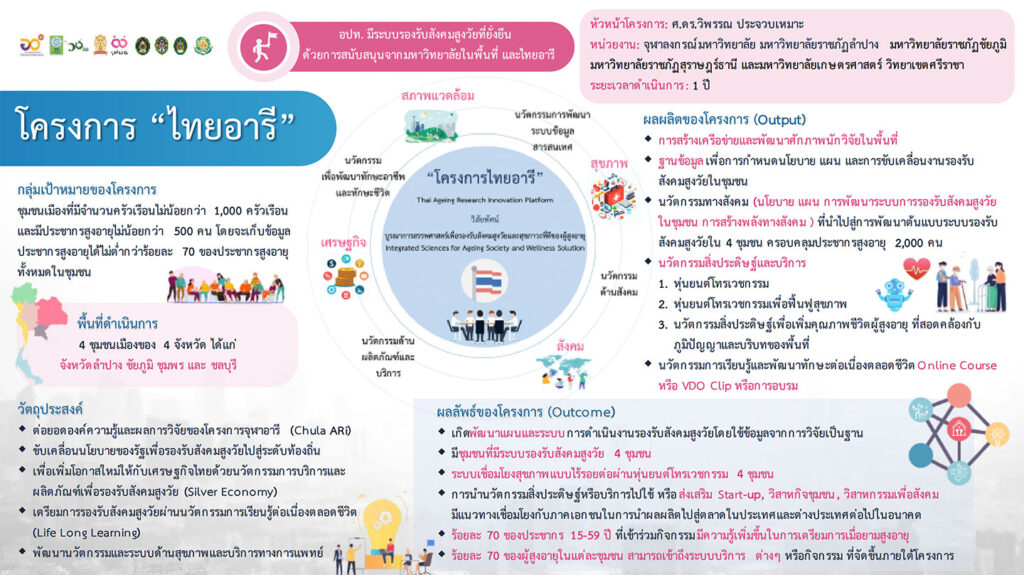
BY
College of Population Studies, Chulalongkorn University
Related articles:
- http://www.chulaari.chula.ac.th/
- http://www.chulaari.chula.ac.th/2021/12/17/%e0%b8%88%e0%b8%b8%e0%b8%ac%e0%b8%b2%e0%b8%ad%e0%b8%b2%e0%b8%a3%e0%b8%b5%e0%b8%81%e0%b8%b1%e0%b8%9a%e0%b8%81%e0%b8%b2%e0%b8%a3%e0%b8%9e%e0%b8%b1%e0%b8%92%e0%b8%99%e0%b8%b2%e0%b8%ad%e0%b8%a2%e0%b9%88/
- https://mgronline.com/greeninnovation/detail/9640000043168
Others
Fungus Brings Forests Back to Life
CU-initiated project helping villagers see the economic value in reforestation
Getting Even with Inequality in Asia
“Getting even – Public policies addressing inequality in Asia”. This book is a collection of research papers drawing lessons from economic and social policies that help reducing inequality in selected Asian countries.

